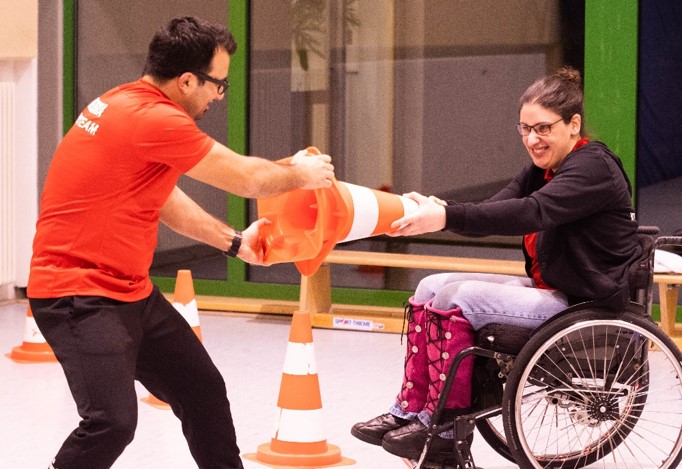This page contains automatically translated content.
Sports Inclusion Manager Katharina Tielmann
 Image: KSV Baunatal.
Image: KSV Baunatal.This can be Ju-Jutsu, for example. In ju-jutsu, some techniques have to be modified so that they also work well with a wheelchair. "But choking is also possible in a sitting position," says Katharina Tielmann from her own experience, because the sports inclusion manager at the Kultur- und Sportverein Baunatal has already tried the martial art herself. Nobody in the inclusive group had any inhibitions about going for the throat of a person in a wheelchair, she reports and smiles: "It was rather difficult for me to attack people I find sympathetic."
Ju-jutsu can also be an effective method of self-defense and self-assertion for people with disabilities - to promote it, videos are to be shot as part of the DOSB project, and a ju-jutsu workshop is also already firmly planned. Rules and procedures are being rethought to ensure that inclusion succeeds. This also applies to the inclusive recreational sports group that Katharina Tielmann initiated and to which participants now even come from Kassel, twelve kilometers away. "See what works for everyone," is the motto, so that the offer is always adapted to the abilities and deficits of the athletes: "You have to be flexible."
Ten years after the UN Convention on the Rights of Persons with Disabilities came into force in Germany, inclusion is much more in the conversation and in the media, the 28-year-old notes: "I myself feel very comfortable and accepted. But often there's still a lot of talk, and people don't know how to implement it." Her approach to making cooperation work better in sports, at work and in everyday life: put yourself in the shoes of others and take their perspective. "How would I feel if someone treated me like that?" is a helpful question for her.
But often the worlds of people with and without disabilities are still very separate, and everyone remains among their own kind, notes Katharina Tielmann, who already dealt with inclusion in sports during her studies of social work at the University of Kassel. "Many facilities and institutions definitely have their justification. But they should open up to the outside world even more." To achieve that in sports, the Baunataler Diakonie Kassel (bdks) facility for the disabled and the Baunatal Culture and Sports Club have started a cooperation: "We want to create more points of contact."
The DOSB project "Qualified for Practice: Inclusion Managers for Non-Profit Sports" is supported by the Federal Ministry of Labor and Social Affairs with funds from the Equalization Fund and finances 22 positions for severely disabled people in nonprofit sports.
This text was originally taken from the website of the DOSB and was kindly made available to us.